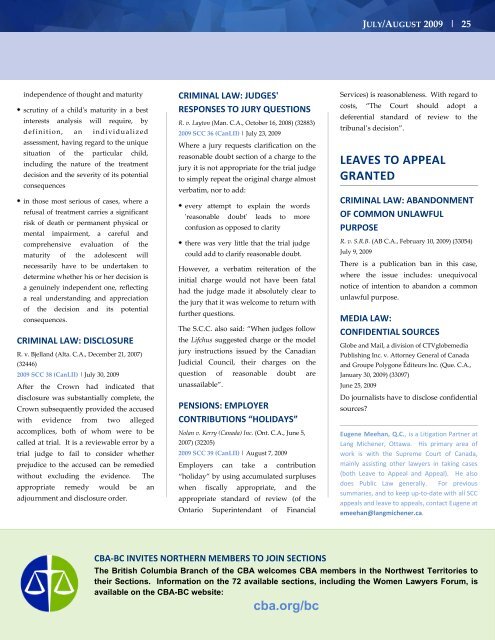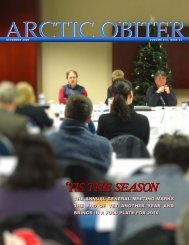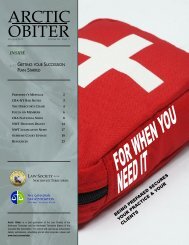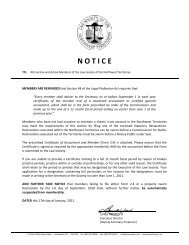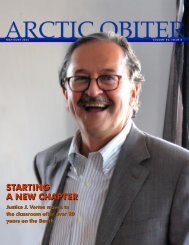ARCTIC OBITER
Arctic Obiter -March 2009 - Law Society of the Northwest Territories
Arctic Obiter -March 2009 - Law Society of the Northwest Territories
- No tags were found...
Create successful ePaper yourself
Turn your PDF publications into a flip-book with our unique Google optimized e-Paper software.
JULY/AUGUST 2009 | 25<br />
independence of thought and maturity<br />
scrutiny of a child's maturity in a best<br />
interests analysis will require, by<br />
definition, an individualized<br />
assessment, having regard to the unique<br />
situation of the particular child,<br />
including the nature of the treatment<br />
decision and the severity of its potential<br />
consequences<br />
in those most serious of cases, where a<br />
refusal of treatment carries a significant<br />
risk of death or permanent physical or<br />
mental impairment, a careful and<br />
comprehensive evaluation of the<br />
maturity of the adolescent will<br />
necessarily have to be undertaken to<br />
determine whether his or her decision is<br />
a genuinely independent one, reflecting<br />
a real understanding and appreciation<br />
of the decision and its potential<br />
consequences.<br />
CRIMINAL LAW: DISCLOSURE<br />
R. v. Bjelland (Alta. C.A., December 21, 2007)<br />
(32446)<br />
2009 SCC 38 (CanLII) | July 30, 2009<br />
After the Crown had indicated that<br />
disclosure was substantially complete, the<br />
Crown subsequently provided the accused<br />
with evidence from two alleged<br />
accomplices, both of whom were to be<br />
called at trial. It is a reviewable error by a<br />
trial judge to fail to consider whether<br />
prejudice to the accused can be remedied<br />
without excluding the evidence. The<br />
appropriate remedy would be an<br />
adjournment and disclosure order.<br />
CRIMINAL LAW: JUDGES'<br />
RESPONSES TO JURY QUESTIONS<br />
R. v. Layton (Man. C.A., October 16, 2008) (32883)<br />
2009 SCC 36 (CanLII) | July 23, 2009<br />
Where a jury requests clarification on the<br />
reasonable doubt section of a charge to the<br />
jury it is not appropriate for the trial judge<br />
to simply repeat the original charge almost<br />
verbatim, nor to add:<br />
every attempt to explain the words<br />
'reasonable doubt' leads to more<br />
confusion as opposed to clarity<br />
there was very little that the trial judge<br />
could add to clarify reasonable doubt.<br />
However, a verbatim reiteration of the<br />
initial charge would not have been fatal<br />
had the judge made it absolutely clear to<br />
the jury that it was welcome to return with<br />
further questions.<br />
The S.C.C. also said: ‚When judges follow<br />
the Lifchus suggested charge or the model<br />
jury instructions issued by the Canadian<br />
Judicial Council, their charges on the<br />
question of reasonable doubt are<br />
unassailable‛.<br />
PENSIONS: EMPLOYER<br />
CONTRIBUTIONS “HOLIDAYS”<br />
Nolan v. Kerry (Canada) Inc. (Ont. C.A., June 5,<br />
2007) (32205)<br />
2009 SCC 39 (CanLII) | August 7, 2009<br />
Employers can take a contribution<br />
‚holiday‛ by using accumulated surpluses<br />
when fiscally appropriate, and the<br />
appropriate standard of review (of the<br />
Ontario Superintendant of Financial<br />
Services) is reasonableness. With regard to<br />
costs, ‚The Court should adopt a<br />
deferential standard of review to the<br />
tribunal’s decision‛.<br />
LEAVES TO APPEAL<br />
GRANTED<br />
CRIMINAL LAW: ABANDONMENT<br />
OF COMMON UNLAWFUL<br />
PURPOSE<br />
R. v. S.R.B. (AB C.A., February 10, 2009) (33054)<br />
July 9, 2009<br />
There is a publication ban in this case,<br />
where the issue includes: unequivocal<br />
notice of intention to abandon a common<br />
unlawful purpose.<br />
MEDIA LAW:<br />
CONFIDENTIAL SOURCES<br />
Globe and Mail, a division of CTVglobemedia<br />
Publishing Inc. v. Attorney General of Canada<br />
and Groupe Polygone Éditeurs Inc. (Que. C.A.,<br />
January 30, 2009) (33097)<br />
June 25, 2009<br />
Do journalists have to disclose confidential<br />
sources?<br />
Eugene Meehan, Q.C., is a Litigation Partner at<br />
Lang Michener, Ottawa. His primary area of<br />
work is with the Supreme Court of Canada,<br />
mainly assisting other lawyers in taking cases<br />
(both Leave to Appeal and Appeal). He also<br />
does Public Law generally. For previous<br />
summaries, and to keep up-to-date with all SCC<br />
appeals and leave to appeals, contact Eugene at<br />
emeehan@langmichener.ca.<br />
CBA-BC INVITES NORTHERN MEMBERS TO JOIN SECTIONS<br />
The British Columbia Branch of the CBA welcomes CBA members in the Northwest Territories to<br />
their Sections. Information on the 72 available sections, including the Women Lawyers Forum, is<br />
available on the CBA-BC website:<br />
cba.org/bc


